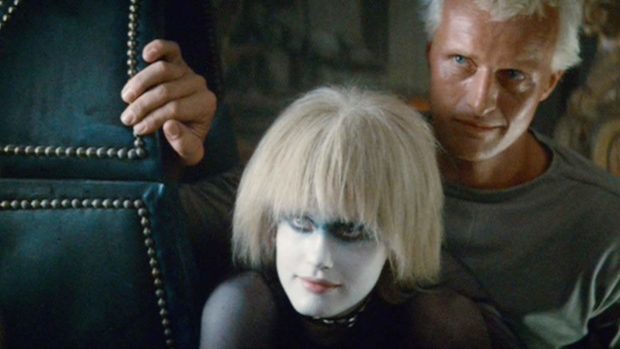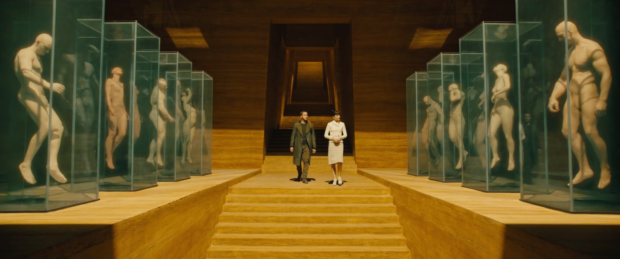
 The sequel to the 1982 science fiction classic does not come near it in beauty, but the integrity of its vision makes it worth your time.
The sequel to the 1982 science fiction classic does not come near it in beauty, but the integrity of its vision makes it worth your time.
This last year saw the release of Blade Runner 2049, a sequel to the 1982 science fiction classic Blade Runner. It’s rather unusual for a sequel to come out 35 years after the original, but this story has an unusual history all around. Based on a Philip K. Dick novel called “Do Androids Dream of Electric Sheep?”, Blade Runner was the third feature by the English director Ridley Scott, who had just scored a major hit with Alien, another science fiction benchmark. Blade Runner starred Harrison Ford as a cop in a dystopian future whose job is to hunt down a group of androids, “replicants” they’re called, who have rebelled against their human masters on a space colony and are now hiding out on Earth. The replicants were invented to do slave labor for human beings, but the invention went out of control and was outlawed. Ford’s character, tired and disillusioned, must ultimately go up against the ruthless and clever leader of the replicants, brilliantly played by Rutger Hauer; and meanwhile falls in love with a woman named Rachael who turns out to be a replicant herself. But not even Ford, immensely popular at the time due to his Star Wars and Indiana Jones roles, was the real star here—the most memorable aspect of Blade Runner was the amazing production design and visual effects, by Laurence G. Paull and Douglas Trumbull. This future world was dark, filled with rain, smoke and neon; and all the effects—the hover crafts, the flashing signs, the forbidding architecture—were done solely with models. There was no computer generated imagery at that time. Add a great musical score by Vangelis, and you have a hypnotic visual masterpiece.
Now one of the most famous films of the 1980s, it must have been a hit at the time, right? Wrong. Warner Brothers was so nervous about it that they tacked on a voice-over narration by Harrison Ford to explain everything, which in my opinion, reduces the film’s power a lot. In any case, in the year of E.T. and Star Trek: Wrath of Khan, Blade Runner got lost in the shuffle. It did not do well. It was only after a few years that it was rediscovered and became a beloved classic, rereleased in several different versions and “director’s cuts.”
 If you haven’t seen Blade Runner yet, it’s imperative that you do so before going to the sequel. I don’t think you can properly understand the second film without the first. Blade Runner 2049 is directed by Denis Villeneuve, fresh from his 2016 science fiction success Arrival. The screenplay is by one of the writers on the original Blade Runner, Hampton Fancher, with help from Michael Green. In this future world, taking place 35 years after Blade Runner, replicants are once again being used, but some of the older models are still being hunted down. Ryan Gosling plays one of those hunters, but the twist here is that he himself is a replicant. Some evidence uncovered at a site where he kills a replicant starts him on a quest to discover the secret of his own origins. Also looking for this secret is the head of the corporation that manufactures the replicants, a sinister figure played by Jared Leto. Eventually Gosling’s character, who goes only by the initial K, encounters Deckard, the cop from the original film, played of course by Harrison Ford.
If you haven’t seen Blade Runner yet, it’s imperative that you do so before going to the sequel. I don’t think you can properly understand the second film without the first. Blade Runner 2049 is directed by Denis Villeneuve, fresh from his 2016 science fiction success Arrival. The screenplay is by one of the writers on the original Blade Runner, Hampton Fancher, with help from Michael Green. In this future world, taking place 35 years after Blade Runner, replicants are once again being used, but some of the older models are still being hunted down. Ryan Gosling plays one of those hunters, but the twist here is that he himself is a replicant. Some evidence uncovered at a site where he kills a replicant starts him on a quest to discover the secret of his own origins. Also looking for this secret is the head of the corporation that manufactures the replicants, a sinister figure played by Jared Leto. Eventually Gosling’s character, who goes only by the initial K, encounters Deckard, the cop from the original film, played of course by Harrison Ford.
The plot is complex and cerebral, as one might expect. There is quite a bit of action and special effects (computer generated this time) that are thrown into the mix. Gosling is effective at portraying a robotic character haunted by intimations of humanity. In comparing the two films, I have to say that the sequel is a lesser film than the first Blade Runner in every way, and yet compared to most science fiction-slash-action movies currently being produced, it’s one of the best. Villeneuve and his screenwriters are aware that many of the themes of the original, and in particular the soulless, corrupt nature of the modern social order, have started to come frighteningly true. So beneath the generic good vs. evil action thriller, there pulses a dark commentary on our times, one that offers the impulse for self-sacrifice as the only element of hope. Blade Runner 2049 doesn’t have the beautiful style of the 1982 classic, but the integrity of its vision makes it worth your time.

